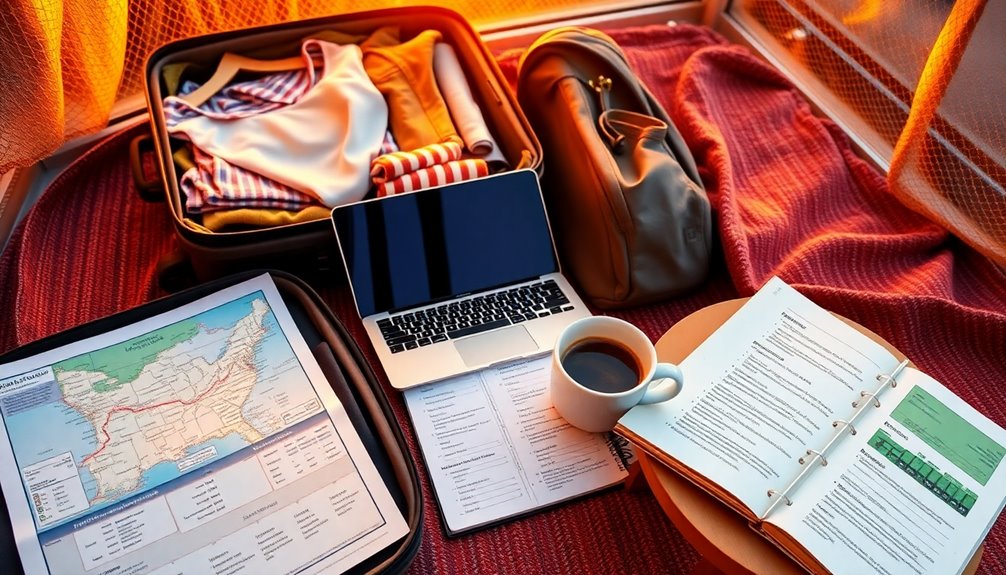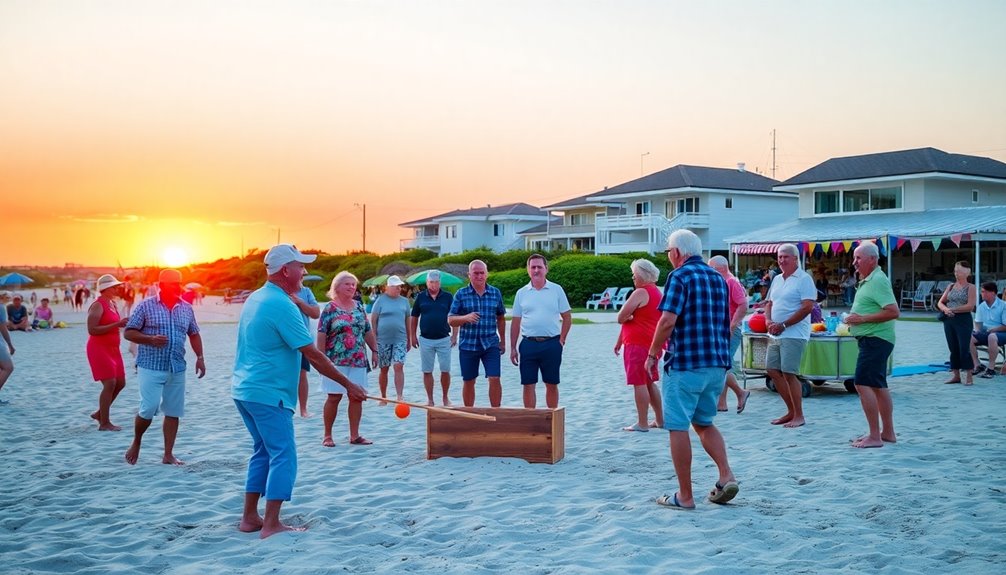To safeguard your retirement savings as a snowbird, create a comprehensive budget for dual living that includes all expenses. Maintain a robust emergency fund of three to six months’ worth of expenses. Be strategic with investments, diversifying your portfolio. Optimize tax strategies based on residency status, and weigh the pros and cons of renting versus buying. Engage in local activities to build connections. Stay informed about legal implications, and utilize technology for financial management. There’s more to explore on this journey! Additionally, consider seeking professional advice to navigate complex financial landscapes and ensure you’re making informed decisions. Leveraging snowbird financial tips for retirees can provide valuable insights into maximizing your retirement income while managing expenses effectively. Ultimately, staying proactive and adaptable in your financial planning will enhance your overall experience as you enjoy the best of both worlds.
Key Takeaways
- Maintain meticulous records of residency to ensure compliance with tax laws and protect against unnecessary tax liabilities.
- Diversify your retirement savings across various accounts to enhance security and reduce risk exposure.
- Regularly review and adjust your investment strategies based on changing personal circumstances and market conditions.
- Consult a tax professional to navigate multistate taxation complexities and optimize your tax strategies.
- Set up an emergency fund with three to six months of living expenses to safeguard against unexpected financial challenges.
Create a Comprehensive Budget for Dual Living

When you're balancing life between two homes, creating a comprehensive budget is essential to ensure financial stability.
Start by calculating the cost of living in both locations, considering housing, food, and transportation. Don't forget about dual housing expenses like mortgages, property taxes, and maintenance for each home.
Factor in travel costs between the two places, as well as healthcare expenses like insurance premiums and out-of-pocket costs. Additionally, ensure you have good medical care in both locations to avoid unexpected health-related expenses. It's also wise to consider the tax implications of maintaining properties in different states, as this can impact your overall financial plan.
Set aside emergency funds for unexpected expenses. Research tax implications in both states, and if you're renting one home, consider potential rental income.
Lastly, plan for maintenance and utility costs, even when you're not occupying one of the residences. This structured approach will help you manage your finances effectively as a snowbird.
Develop a Strategic Investment Plan

How can you ensure your retirement savings grow effectively while you enjoy life between two homes? Start by diversifying your investment portfolio.
Consider alternative investments like real estate or commodities to reduce reliance on traditional stocks. Tailor your approach with separately managed accounts that align with your risk tolerance and retirement goals. Incorporating high-caliber strategies can enhance your potential for growth while preserving your capital. Additionally, consider the benefits of Gold IRAs as a way to hedge against market downturns and inflation.
Regularly assess your risk and time horizon, spreading your investments across asset classes to mitigate risks. Leverage financial planning tools, including retirement planning software and professional advisors, to optimize your strategies.
Stay informed with continuous market analysis and monitor your investment performance. Remember to adjust your strategies as personal circumstances or market conditions change, ensuring your savings remain robust and adaptable throughout your snowbird lifestyle.
Maintain a Robust Emergency Fund

While you enjoy the flexibility of a snowbird lifestyle, maintaining a robust emergency fund is essential for financial peace of mind. Aim to save three to six months of living expenses in an easily accessible account. This fund provides security against unexpected events, like medical emergencies or home repairs, especially when managing two homes. Set up automatic transfers to simplify saving, starting with manageable amounts like $25 per paycheck. Use online calculators to determine your ideal savings target and regularly review your fund to ensure it meets your needs. Additionally, it's important to consider the emotional support available during unexpected financial crises, as this can greatly impact your overall wellbeing. Diversify your savings across different accounts for added security, and always be prepared for seasonal expenses or unexpected repairs. Additionally, having an emergency fund aligns with the goal of saving early to protect your retirement savings and ensure you can enjoy your travels with confidence.
Optimize Your Tax Strategies Across Borders

Building a solid emergency fund is only part of the financial picture for snowbirds. You need to optimize your tax strategies across borders to protect your retirement savings.
Start by understanding your residency status based on the 183-day rule and your domicile establishment. Sever ties with your original state to avoid dual residency issues. Keep meticulous documentation of the time spent in each state, as it's vital for tax purposes. Additionally, be aware that state requirements for residency can vary significantly, which may impact your tax obligations. Understanding your required minimum distributions is essential to avoid penalties as you transition between states.
Take advantage of tax benefits and deductions to reduce your overall tax liability. Regularly review your tax strategies to stay compliant with changing laws.
Finally, consider working with a tax professional or financial advisor to navigate the complexities of multistate taxation and maximize your savings.
Choose Between Renting and Buying Wisely

When deciding whether to rent or buy as a snowbird, it's essential to weigh your personal goals and financial situation. Renting offers flexibility, allowing you to explore different locations without long-term commitment. It's ideal if you're a first-time snowbird or plan to stay for shorter periods, as it typically involves lower upfront costs and fewer financial responsibilities. Cash flow may favor renting due to lower upfront costs. Additionally, understanding the average divorce costs could help you better manage your financial situation if personal circumstances change. On the other hand, buying provides stability and the potential for property appreciation, making it a good choice if you plan to stay in one area for more than four months each year. However, owning two homes comes with ongoing maintenance costs, taxes, and insurance. Ultimately, your decision should align with your lifestyle preferences and financial capabilities.
Plan Your Travel and Logistics Efficiently

To enjoy a smooth transition to your seasonal getaway, it's crucial to plan your travel and logistics efficiently.
Start by booking flights and accommodations early to avoid peak season prices. Aim to travel in late October or early November to dodge the crowds. Additionally, maximizing savings on airfare through senior discounts or travel rewards can further enhance your budget for the trip. Consider setting a budget plan to allocate funds for both travel and leisure activities.
Flexibility is key; prepare for delays with backup plans. Use tools like the RoadTrippers App to map routes and discover attractions along the way.
Ensure your vehicle is road-ready with a thorough inspection and consider roadside assistance for emergencies. If flying, compare prices and book in advance.
Lastly, factor in pet needs if driving, like finding pet-friendly accommodations. A little planning goes a long way in ensuring a hassle-free trip!
Engage in Local Activities for Social Connection

Engaging in local activities not only enriches your snowbird experience but also helps you forge meaningful connections in your seasonal home.
Joining local clubs tailored for snowbirds creates opportunities to meet others who share your interests, whether in sports or hobbies. These clubs foster community by hosting events and get-togethers that integrate you into the local culture. Additionally, participating in these clubs can lead to numerous social opportunities, contributing to a sense of belonging. Regular engagement in social activities can also improve mental stimulation, which is essential for overall well-being.
Participating in community events like farmer's markets and festivals lets you connect with both locals and fellow snowbirds, enhancing your social network.
Volunteering offers a rewarding way to meet like-minded individuals while giving back.
Finally, taking classes at community centers or colleges allows you to learn new skills and make friendships, all while stimulating your mind and body.
Stay Informed About Legal and Tax Implications

Staying informed about legal and tax implications can save you from unnecessary headaches as a snowbird.
Understand your residency status; spending 183 days or more in a state typically establishes residency for tax purposes. Your domicile choice impacts taxes, so consider where you spend the most time or maintain significant ties. Additionally, proper estate planning is essential for managing assets in multiple states, ensuring that your wishes are honored regardless of where you reside. State programs can also assist with healthcare costs for retirees, adding another layer of consideration in your planning.
Remember, states have varying tax laws—some impose no income tax, while others do. Be aware of your income tax obligations, especially if you earn from multiple states, and keep track of property taxes if you own in more than one location.
Lastly, local estate tax rules can affect your inheritance plans, so consult with a tax advisor to ensure you're optimizing your situation.
Utilize Technology for Financial Management

As snowbirds navigate their unique financial landscapes, leveraging technology can streamline your financial management significantly.
Use budgeting apps like Mint or Personal Capital to track expenses for both your primary and secondary homes. Platforms like Robinhood and Fidelity let you monitor your investments in real-time, ensuring you're always informed. Planning for retirement aims to maintain your desired lifestyle, making it crucial to stay organized and aware of your financial status.
For bill payments, services such as Zelle and PayPal enable easy transactions from anywhere. Don't forget expense tracking tools like Expensify, which can help with tax categorization.
Automate savings and bill payments to avoid late fees and enhance your financial stability.
Finally, keep your accounts secure by using password managers and enabling two-factor authentication, ensuring your financial data remains protected while you enjoy your time away.
Keep Detailed Records for Future Reference

Managing your finances effectively as a snowbird involves more than just using technology; it also requires keeping detailed records for future reference.
Start by documenting all your travel dates and durations to prove residency, and keep receipts for trips, including flights and accommodations. A calendar or planner helps track where you spend your time.
Organize your bank statements from all accounts and document any financial ties to the states you visit. Maintaining records of primary state residency can help clarify your tax obligations and minimize liabilities.
Maintain property records, including deeds, tax payments, and maintenance logs.
Lastly, ensure you have tax compliance records, like filed tax returns and deductions claimed.
These thorough records not only simplify your financial management but also safeguard your retirement savings against potential pitfalls.
Frequently Asked Questions
How Can I Protect My Retirement Savings From Inflation?
To protect your retirement savings from inflation, consider diversifying your investments. Allocate funds to stocks and inflation-protected bonds, like TIPS, which adjust for inflation.
Keep an eye on your budget and identify areas to cut back during inflationary periods. Regularly review your portfolio to make necessary adjustments, and think about increasing contributions, especially if you're over 50.
Staying proactive will help maintain your purchasing power as inflation rises.
What Are the Best Ways to Diversify My Investment Portfolio?
Imagine a vibrant garden, flourishing with a variety of plants. To diversify your investment portfolio, think similarly.
Mix asset classes—stocks, bonds, and real estate—to balance risk and reward. Explore international markets for geographic diversity and sprinkle in different sectors like technology and healthcare.
Consider using index funds or ETFs for cost-effective exposure. Regularly rebalance your portfolio, ensuring it adapts to changing conditions, just like tending to that thriving garden.
How Do I Handle Unexpected Medical Expenses While Traveling?
When you travel, unexpected medical expenses can seriously impact your finances.
To handle these, always prioritize getting comprehensive travel insurance that covers emergencies, including high U.S. healthcare costs. Make sure your policy accounts for pre-existing conditions and offers sufficient coverage limits.
Familiarize yourself with local healthcare facilities and have a plan for emergencies.
Lastly, keep your insurance information handy to avoid financial surprises during your trip.
What Should I Know About Currency Exchange Rates?
When you're dealing with currency exchange rates, it's crucial to understand how they fluctuate based on various factors like inflation and market demand.
Higher interest rates can strengthen a currency, while political stability can create uncertainty.
Always check bid and ask prices to ensure you're getting a fair deal.
Timing your exchanges can save you money, so keep an eye on market trends and consider using forward contracts for future transactions.
How Can I Find Trustworthy Local Services in My Second Location?
To find trustworthy local services in your second location, start by checking online reviews on platforms like Yelp and Google.
Ask neighbors or fellow snowbirds for recommendations, and look into local directories for highly-rated providers.
Make sure to verify licenses and insurance coverage before hiring.
Engaging with community centers or social media groups can also help you connect with reliable services.
Don't forget to assess their experience and pricing transparency.
Conclusion
In navigating your retirement as a snowbird, think of your finances like a well-tended garden. With the right budget, investment plan, and emergency fund, you'll cultivate a flourishing landscape of opportunities. Just as a gardener keeps an eye on the weather, stay informed about taxes and legalities. By nurturing connections and utilizing technology, you'll ensure your retirement blossoms beautifully. Remember, a little planning now can yield a bountiful harvest later—so get planting!
References
- https://www.fidelity.ca/en/insights/articles/this-is-how-you-can-be-a-snowbird-in-retirement/
- https://formwealth.com/5-tips-to-prepare-for-the-snowbird-lifestyle-in-retirement/
- https://midlifesnowbird.com/snowbird-secrets/
- https://www.ideamktg.com/blog/how-to-use-google-trends-to-plan-content/
- https://financialpost.com/personal-finance/family-finance/snowbirds-face-hurdles-achieving-desired-retirement-lifestyle
- https://www.buttonwoodfg.com/financial-tips-for-snowbirds
- https://www.finsyn.com/finance-tips-and-hidden-costs-for-snowbirds/
- https://www.kiplinger.com/retirement/how-to-be-a-snowbird-in-retirement
- https://www.snowbirdswealthmanagement.com/how-we-help/investment-strategies
- https://www.bankwithunited.com/learning/investment-retirement/10-tips-and-strategies-to-make-the-most-of-your-financial-future.html









